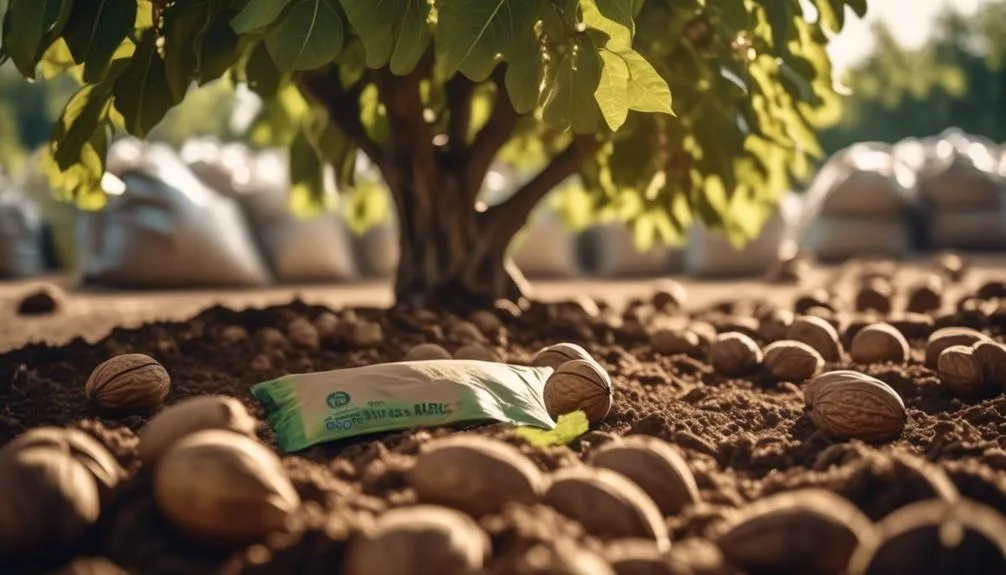If you've chosen to use organic fertilizers for your walnut trees, you've made a great decision for their long-term health. With so many options available, it can be overwhelming to figure out which ones are best. We've narrowed it down to the top five organic fertilizers that will help your walnut trees thrive.
But first, let's talk about why organic fertilizers are crucial for the overall well-being of your walnut trees.
Key Takeaways
- Organic fertilizers, such as fish emulsion and composted manure, promote the long-term health and productivity of walnut trees.
- These fertilizers enhance nutrient absorption in the soil, improving soil health, structure, and fertility.
- Bone meal is an excellent source of phosphorus and calcium, supporting root development and nutrient absorption in walnut trees.
- Wood ash and seaweed extract provide additional benefits, such as raising soil pH levels, enhancing nutrient absorption, and promoting robust root development and tree resistance to stress and diseases.
Fish Emulsion
Fish emulsion is a nutrient-rich liquid fertilizer that can provide essential nutrients to walnut trees, promoting healthy growth and productivity. This organic fertilizer is a great source of nitrogen, phosphorus, and potassium, which are vital for the overall health of walnut trees.
When applied to the soil, fish emulsion enhances nutrient absorption, ensuring that the trees receive the necessary elements for robust growth. Additionally, fish emulsion contributes to soil health by promoting microbial activity and improving soil structure.
The organic matter in fish emulsion also helps to enhance the soil's ability to retain moisture, creating a favorable environment for walnut trees. By incorporating fish emulsion into your walnut tree care routine, you can effectively support the trees' development while maintaining the health and fertility of the soil.
Composted Manure
To effectively nourish your walnut trees and enhance their growth, consider incorporating composted manure as an organic fertilizer option. Composted manure is a fantastic choice for providing essential nutrients and improving soil structure, creating an optimal environment for walnut tree growth.
Here are some key points to keep in mind when using composted manure:
- Nutrient content: Composted manure is rich in essential nutrients such as nitrogen, phosphorus, and potassium, which are vital for the healthy growth of walnut trees.
- Application frequency: Apply composted manure to your walnut trees once a year in the early spring to ensure a steady supply of nutrients throughout the growing season.
- Soil enrichment: Composted manure improves soil fertility, enhances microbial activity, and promotes better water retention, all of which benefit walnut tree health.
- Organic matter: The organic matter in composted manure helps to improve soil structure, aeration, and overall soil health, contributing to the long-term well-being of your walnut trees.
Bone Meal
Bone meal serves as an excellent organic fertilizer option for nourishing walnut trees and promoting their healthy growth and development. It's a valuable source of phosphorus and calcium, essential nutrients for walnut trees.
When applied to the soil, bone meal acts as a soil amendment, enhancing the overall soil structure and fertility. This promotes better root development and nutrient absorption, crucial for the health of walnut trees.
The slow-release nature of bone meal ensures that nutrients are available to the trees over an extended period, supporting steady growth. Additionally, bone meal can help balance the soil's pH levels, creating an optimal environment for walnut trees to thrive.
When using bone meal, ensure proper application according to the specific needs of your walnut trees to maximize its benefits.
Wood Ash
Wood ash provides essential nutrients and minerals for walnut trees, contributing to their overall health and growth. When using wood ash as a fertilizer for your walnut trees, consider the following:
- Soil Acidity: Wood ash can help raise soil pH levels, making it less acidic. This is beneficial for walnut trees, as they thrive in slightly acidic to neutral soil.
- Potassium Content: Wood ash is high in potassium, which is crucial for overall tree health, improving disease resistance, and promoting strong root growth.
- Nutrient Absorption: The potassium in wood ash enhances the tree's ability to absorb other essential nutrients, ensuring that your walnut trees receive the necessary elements for optimal growth.
- Calcium and Magnesium: Wood ash also contains calcium and magnesium, which are vital for the development of strong, healthy walnut trees.
Seaweed Extract
As you explore organic fertilizers for your walnut trees, the potential benefits of incorporating seaweed extract into your fertilization regimen become increasingly apparent.
Seaweed extract is rich in nutrients, including potassium, nitrogen, and various trace elements that are essential for the healthy growth of walnut trees.
One of the key benefits of seaweed extract is its ability to improve the tree's resistance to environmental stressors and diseases while promoting robust root development.
When applying seaweed extract, consider using a foliar spray to ensure optimal absorption, or incorporate it into the soil during watering.
This versatile fertilizer can also be used in combination with other organic fertilizers to enhance its effectiveness.
Conclusion
Incorporating organic fertilizers like fish emulsion, composted manure, bone meal, wood ash, and seaweed extract can greatly benefit the health and productivity of your walnut trees.
By choosing natural fertilizers, you're providing essential nutrients without the use of harmful chemicals.
Give these organic options a try and witness the flourishing growth of your walnut trees.

